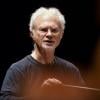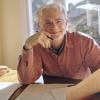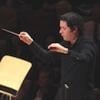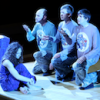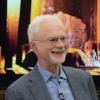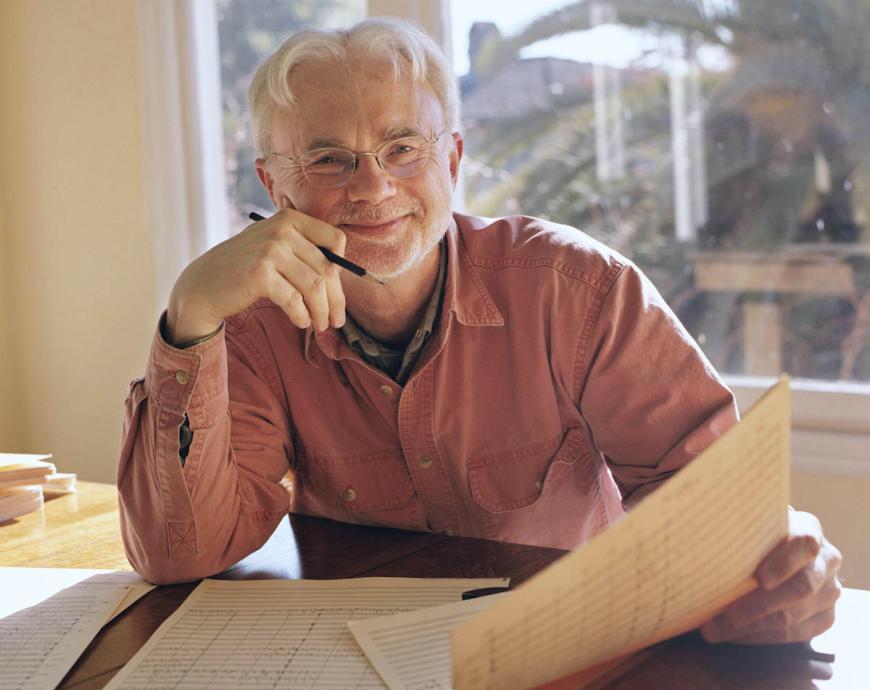
John Adams turned 75 earlier this year — and if he chooses to do so amid a busy schedule of composing and conducting, he can look back upon an extraordinary career filled with change. Californians have had ringside seats to his evolution all along, from his associations with the San Francisco Conservatory of Music and the San Francisco Symphony in the 1970s and ’80s to his current post as creative chair for the Los Angeles Philharmonic and in September, the world premiere of a new opera Antony and Cleopatra at San Francisco Opera.
A New Englander by birth whose full name (John Coolidge Adams) encompasses three presidents from Massachusetts, this member of Harvard’s Classes of 1969 and 1972 had a streak of rebellious irreverence that probably guaranteed he wouldn’t stay on the East Coast fast track for long. “When I was a college student,” he told the Berlin Philharmonic’s Sarah Willis in a 2017 video interview, “the models were, you know, the sort of postwar avant-garde — Boulez, Berio, Stockhausen; in the United States, Elliott Carter, Milton Babbitt. And even with John Cage, the sort of way that you did things was to make sure that nothing in your work bears a trace from the past.
“[But] I could never adopt a modernist point of view, I think. First of all, because I was a hippie. I stood in line at 8 in the morning to get the first copy at Harvard Square of Sgt. Pepper’s Lonely Hearts Club Band. I saw how much music meant to everybody. I just couldn’t identify [with] that refined, alien complexity, the world of avant-garde contemporary music of the Darmstadt tradition. I wanted to make music that had all of the elements of my life as an American, not only of the rhythm and the sensuality of it, but all of my love of the great works and sort of invite them into my pieces.”
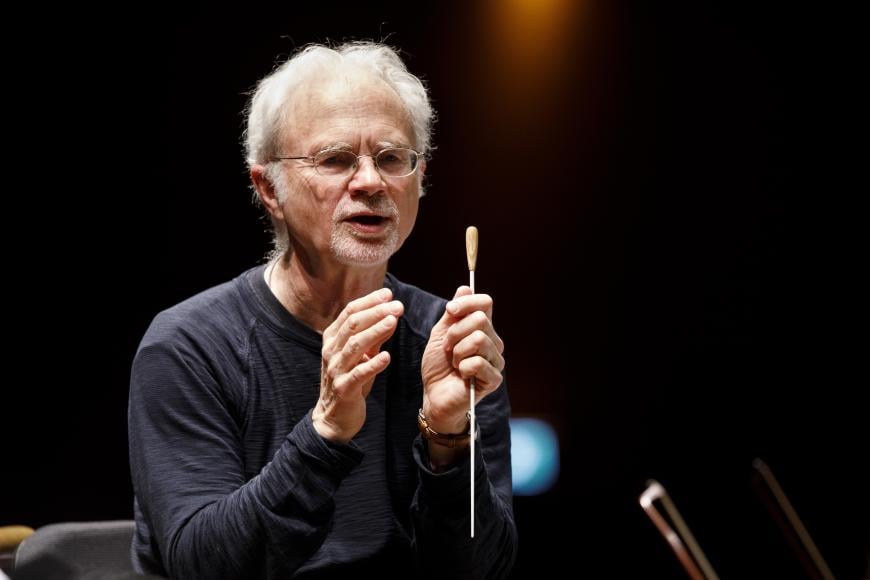
So Adams turned his back on the East Coast establishment and its serial-music ways in the summer of 1971, and drove his Volkswagen Beetle west across the country to establish a beachhead in San Francisco as far away from New England as he could. He absorbed first the ideas of Cage, then minimalism, and eventually evolved into what I would call a “maximalist” composer, with major opera companies and symphony orchestras at his disposal. Yet he retained his irreverence, concocting oddball titles for many of his works, using electric instruments as integral parts of his orchestras, unabashedly embracing American pop culture, refusing to leave his political beliefs at the door of the opera house.
Fortunately, Nonesuch has been assiduously recording almost every new Adams piece as they have come out — just as Columbia used to do with Stravinsky and Copland, and Decca did with Britten, a throwback to an earlier era of corporate responsibility — with other labels chipping in as well. Where to start? Read on.
Shaker Loops (1978, revised 1983)
This is the piece that served notice, at least to the new music community, that Adams was a fresh new force to be reckoned with. It’s a minimalist piece through and through, but what comes through most startlingly is its debt to Sibelius’s Fourth and Fifth Symphonies in its motor-driven outer portions. The Sibelius influence on minimalism wouldn’t be acknowledged until the Finnish composer became fashionable again after a long period of not being taken seriously. Originally written for string septet, the string orchestra expansion receives a performance of great verve, haze and weight from Adams’s first major advocates, Edo de Waart and the San Francisco Symphony (Philips or Decca). Adams’s own recording with the Orchestra of St, Luke’s (Nonesuch) is brisk and more direct. Also, try Sian Edwards’s tougher, abrasive rendition of the septet version with the Ensemble Modern (RCA).
Harmonielehre (1984-85)
With this work, Adams decisively expanded his realization of the possibilities of writing for a symphony orchestra, in his words, “taking fin de siècle gestures and harmony, Debussy, Mahler, Sibelius, Wagner, and putting them through the box of minimalism. It’s a kind of characteristic piece from my early period.” De Waart and the SFS made the first recording (Nonesuch) only three days after the work’s 1985 premiere, a beautiful performance, but Simon Rattle and the City of Birmingham Symphony Orchestra got a hold of Adams’s revised version with even more ravishing, full-bodied results (Warner Classics). In this century, the SFS revisited the piece with Michael Tilson Thomas, playing better than ever and lending darker colors to the second movement (SFS Media, SACD), and Adams led the Berlin Philharmonic in a smooth, sleek performance (see Anthologies below).
Nixon in China (1985-87)
An outlandish idea when first proposed by stage director Peter Sellars, ridiculed by many when it was first staged, the very notion of an opera based on Richard Nixon’s 1972 visit to China has had an even greater influence than the substance of the work itself. It basically pioneered a flood of new operas based on current events that continues to this day, as well as a letting go of traditional straightforward storylines. It also inaugurated a string of Adams/Sellars operas and opera-oratorios, usually with contemporary or historical subjects. Again, de Waart led the first recording (Nonesuch, 3 CDs), and another, brighter-sounding audio version from Marin Alsop and Opera Colorado exists (Naxos, 3 CDs). But you’ll get a better all-around impression of Nixon in the video recording of Sellars’s 2011 revised production for the Metropolitan Opera (Nonesuch, DVD or Blu-ray), with the composer driving his motor rhythms onward with relish.
Chamber Symphony (1992)
Here, two sides of Adams collide — the rigorous figurations of a serious composer paying homage to Schoenberg’s piece of the same name, and the wild polyphony and pounding pulse of a “trickster” composer’s ode to Saturday morning cartoon music. Edwards and Ensemble Modern have no trouble unraveling its complexities (RCA), but the composer truly captures his music’s jaunty antics with the London Sinfonietta (Nonesuch). This led to a sequel in 2007 which Adams, evidently familiar with horror movies, labeled Son of Chamber Symphony. Both Chamber Symphonies can be heard on a disc aimed toward hip millennials, where lively performances by Alan Pierson and Alarm Will Sound are preceded by “podcasts” that walk listeners through the music (Cantaloupe).
El Niño (2000)
The opera-oratorio El Niño is really a 21st-century Messiah, with about one-third of the score devoted to settings of Spanish-language poems that comment directly or indirectly on the story of the Nativity. El Niño signaled a major growth in Adams’s powers at the beginning of the new century — a deepening of emotion in his writing, an increased mastery of orchestration, evermore complexity in his maximalist manner, and now, elements of mystery and wonder. Kent Nagano leads the Deutsches Symphonie-Orchester Berlin, the Theatre of Voices, London Voices, and singers Lorraine Hunt Lieberson, Dawn Upshaw, and Willard White (Nonesuch, 2 CDs).
Absolute Jest (2012, revised 2013)
Adams’s obsession with Beethoven started early and has infiltrated a number of works, of which Absolute Jest is a delight. It’s a 25-minute concerto grosso for string quartet and orchestra that takes fragments of some of Beethoven’s most energetic music and runs them through Adams’s electric blender into something entertaining and thought-provoking. There is ambiguity here; is “jest” short for a Latin word “jesta,” which means “notable deed,”? Or is it a real jest, for Adams calls it a “colossal scherzo,” — and the definition of scherzo is “joke”? Whatever. Tilson Thomas conducts the San Francisco Symphony, with the St, Lawrence String Quartet up front and center. (SFS Media, SACD).
The disc also contains Adams conducting the piece that was a succès de scandale in New York in 1983, Grand Pianola Music, whose notorious finale “On the Dominant Divide” can be interpreted either as a send-up of Beethoven or as a sincere neo-Romantic statement, depending upon which side of the divide you’re on.
Must the Devil Have All the Good Tunes? (2018)
At an age when most composers tend to mellow, Adams came up with this rambunctious totentanz — and one of his funniest titles. This is really his third piano concerto (after Eros Piano and Century Rolls), written for Yuja Wang and quickly taken up by other steel-fingered virtuosos. It opens with the pianist pounding out heavy chords that instantly bring to mind Henry Mancini’s insistent Peter Gunn theme. The piano is constantly busy throughout the 28-minute piece’s three-part fast-slow-fast structure, much of it sharing Century Rolls’ brittle, rhythmic, percussive agenda. There is a contemplative slow movement, but the orchestra seems to be impatiently waiting its turn to rock and roll again, which it soon does with a dotted-note groove and electric bass underpinning. In all, a boisterously satisfying vehicle for Wang, Gustavo Dudamel and the LA Phil whose physical release, curiously, was restricted to a limited-edition LP (Deutsche Grammophon).
Anthologies
There have been a number of John Adams anthologies issued over the years, always an ephemeral proposition since his creative life continues to evolve beyond the scope of such onetime projects. The John Adams Earbox (Nonesuch, 10 CDs) thoroughly covered his years with the label from the mid-1980s years up through the mid-1990s, and smaller collections like the audio companion to his memoir Hallelujah Junction (Nonesuch, 2 CDs) and the soundtrack to I Am Love (Nonesuch, CD) served as introductory samplers. In June, if you have the bucks and can wait, Nonesuch promises John Adams Collected Works, a 40-CD cube that will have all of the Nonesuch recordings, plus licensed recordings from other labels to fill the holes. Due June 24, 2022.
But my choice for an Adams collection is the Berlin Philharmonic’s home-grown, luxury-class John Adams Edition, (Berliner Philharmoniker, 4 CDs, 2 Blu-rays), recorded in 2016-17 during his 70th birthday season when he was their first composer-in-residence. The box doesn’t pretend to cover everything, but it gives you seven works from four decades — Harmonielehre, Short Ride in a Fast Machine, The Wound Dresser, Lollapalooza, City Noir, The Gospel According To The Other Mary, and Scheherazade.2 — played to the hilt by a Rolls-Royce-quality orchestra in performances that often exceed those of their predecessors. Five conductors — Simon Rattle, Gustavo Dudamel, Alan Gilbert, Kirill Petrenko and Adams himself — take turns on the podium, and you can either hear them on conventional CDs, streaming services, and “studio master” downloads, or view them on high-res, multi-channel Blu-ray discs. As bonuses, it also has the interview with Sarah Willis that I referred to at the top of this article, and a documentary about Adams’s Berlin residency.


